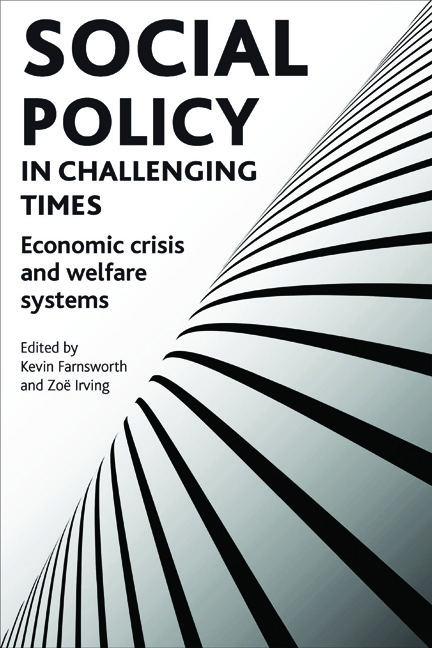Book contents
- Frontmatter
- Contents
- List of figures and tables
- Notes on contributors
- Acknowledgements
- one Varieties of crisis
- two The economic crisis and paradigm change
- three From financial crisis to fiscal crisis
- four Credit crunch, inequality and social policy
- five Global social policy responses to the economic crisis
- six Poverty, the crisis and social policy responses developing countries in developing countries
- seven South Korea after the 1997 economic crisis: a ‘paradigm shift’?
- eight China's response to crisis: what role for social policy?
- nine Tiptoeing through crisis? Re-evaluating the German social model in light of the global recession
- ten Ireland and the impact of the economic crisis: upholding the dominant policy paradigm
- eleven Waving not drowning: Iceland, kreppan and alternative social policy futures
- twelve Experiences from two financial crises in the Nordic welfare states: 1990-93 and 2008-10 compared
- thirteen Social policy and the recent economic crisis in Canada and the United States
- fourteen From economic crisis to a new age of austerity: the UK
- fifteen Responding to the challenges: some concluding remarks on welfare futures in changed circumstances
- Bibliography
- Index
six - Poverty, the crisis and social policy responses developing countries in developing countries
Published online by Cambridge University Press: 07 September 2022
- Frontmatter
- Contents
- List of figures and tables
- Notes on contributors
- Acknowledgements
- one Varieties of crisis
- two The economic crisis and paradigm change
- three From financial crisis to fiscal crisis
- four Credit crunch, inequality and social policy
- five Global social policy responses to the economic crisis
- six Poverty, the crisis and social policy responses developing countries in developing countries
- seven South Korea after the 1997 economic crisis: a ‘paradigm shift’?
- eight China's response to crisis: what role for social policy?
- nine Tiptoeing through crisis? Re-evaluating the German social model in light of the global recession
- ten Ireland and the impact of the economic crisis: upholding the dominant policy paradigm
- eleven Waving not drowning: Iceland, kreppan and alternative social policy futures
- twelve Experiences from two financial crises in the Nordic welfare states: 1990-93 and 2008-10 compared
- thirteen Social policy and the recent economic crisis in Canada and the United States
- fourteen From economic crisis to a new age of austerity: the UK
- fifteen Responding to the challenges: some concluding remarks on welfare futures in changed circumstances
- Bibliography
- Index
Summary
Introduction
The onset of the post-2007 financial crisis in countries of the Organisation for Economic Co-operation and Development (OECD), particularly the United Kingdom (UK) and the United States (US), and its subsequent spread on a global scale has raised concerns regarding its impact on developing countries, and more specifically the likely impact of the crisis on poverty, vulnerability and other social indicators. These concerns come on top of earlier concerns regarding the impact on poverty of the recent volatility of food prices, and of climate change. The crisis is widely expected to afflict the economies of developing countries, through the effects of sharp contractions in trade and investment (World Bank, 2009b). Although a great deal has been written about the size and importance of the crisis, with some commentators drawing parallels with the 1930s crisis, uncertainty remains on the likely scale and duration of the downturn. A prolonged downturn could have a deep and lasting impact on global poverty and vulnerability.
Concerns about the impact of the crisis in developing countries have drawn attention to the role of social policies in mitigating its worst effects. Over the last decade or so, large-scale programmes providing direct assistance to households in poverty have emerged in the South (Barrientos and Hulme, 2008). At the onset of the financial crisis, evidence on the positive impact of these programmes on poverty and vulnerability had accumulated into a strong knowledge base informing policy at national and regional levels (Rawlings and Rubio, 2005; Grosh et al, 2008; Fiszbein and Schady, 2009). There is, therefore, a well-founded expectation that social assistance programmes could play an important and positive role in tackling the adverse effects of the financial crisis. This chapter examines the role and significance of social policies in developing countries, and especially social assistance, against the context of the crisis.
In the work of the International Labour Office (ILO), social protection is associated with a range of public institutions, norms and programmes aimed at protecting workers and their households from contingencies threatening basic living standards. Broadly, these can be grouped under three main headings: social insurance, social assistance and labour market regulation. Social insurance consists of programmes providing protection against lifecourse contingencies such as maternity and old age, or work-related contingencies such as unemployment or sickness. Social assistance provides support for those in poverty.
- Type
- Chapter
- Information
- Social Policy in Challenging TimesEconomic Crisis and Welfare Systems, pp. 101 - 118Publisher: Bristol University PressPrint publication year: 2011



